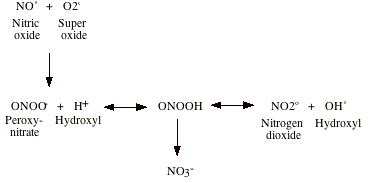Lotus97
Senior Member
- Messages
- 2,041
- Location
- United States
There was a thread started about this in the Methylation/Chelation forum, but since not everyone follows that forum and the General Treatment forum I thought it would be a good idea to start a thread about it here also. I think everyone is in agreement that peroxynitrite is bad. It's been suggested that increasing nitric oxide (NO) would be bad because it could lead to more peroxynitrite (ONOO), but I don't know if there's any consensus about whether or not it would be a good idea to take supplements that increase nitric oxide.

